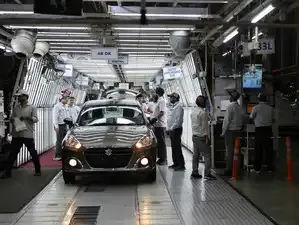
Maruti Suzuki, India’s largest carmaker, expects domestic passenger vehicle sales to regain momentum after two years of sluggish growth, with the company forecasting a return to a 7 per cent annual growth rate by the next fiscal. The optimism follows the government’s decision to cut goods and services tax (GST) on automobiles, a move expected to ease affordability pressures in the market.
Partho Banerjee, Senior Executive Officer for Marketing and Sales at Maruti Suzuki India, said at the annual convention of Society of Indian Automobile Manufacturers (SIAM) in Delhi that the long-term compound annual growth rate (CAGR) of the auto industry -- historically around 7 per cent -- was likely to be restored from 2026-27.
He projected stronger gains in the small car segment, where Maruti has a dominant presence, with sales growth estimated at about 10 per cent.
Banerjee noted that a mix of policy and monetary measures would contribute to this recovery. Alongside the GST rate cut, income tax relief for individuals earning up to Rs 12 lakh annually and the transmission of repo rate cuts by the Reserve Bank of India are expected to lower equated monthly instalments (EMIs).
These changes could make small cars more affordable, spurring demand from two-wheeler owners looking to upgrade, he said.
“This is a big opportunity for all two-wheeler customers to step up to a four-wheeler,” Banerjee said on the sidelines of the meeting.
Passenger vehicle sales in India have been under pressure, especially in the small car category, due to rising costs and limited affordability.
Between April and August this fiscal, sales were recorded at 17.05 lakh units, down slightly from 17.31 lakh in the same period last year, industry estimates show.
However, Maruti Suzuki believes the tide is already turning. Since the GST reduction was announced, customer enquiries have risen by 15 per cent, despite the ongoing Shraadh period, which is traditionally considered inauspicious for major purchases.
Banerjee said market sentiment was showing clear signs of revival.
The company has already passed on the benefits of the GST cut to customers, a move expected to sharpen its edge in the price-sensitive small car segment. Industry watchers say the next few quarters will be critical in determining whether these tax and policy measures can reverse the slowdown and restore steady growth in India’s passenger vehicle market.
Partho Banerjee, Senior Executive Officer for Marketing and Sales at Maruti Suzuki India, said at the annual convention of Society of Indian Automobile Manufacturers (SIAM) in Delhi that the long-term compound annual growth rate (CAGR) of the auto industry -- historically around 7 per cent -- was likely to be restored from 2026-27.
He projected stronger gains in the small car segment, where Maruti has a dominant presence, with sales growth estimated at about 10 per cent.
Banerjee noted that a mix of policy and monetary measures would contribute to this recovery. Alongside the GST rate cut, income tax relief for individuals earning up to Rs 12 lakh annually and the transmission of repo rate cuts by the Reserve Bank of India are expected to lower equated monthly instalments (EMIs).
These changes could make small cars more affordable, spurring demand from two-wheeler owners looking to upgrade, he said.
“This is a big opportunity for all two-wheeler customers to step up to a four-wheeler,” Banerjee said on the sidelines of the meeting.
Passenger vehicle sales in India have been under pressure, especially in the small car category, due to rising costs and limited affordability.
Between April and August this fiscal, sales were recorded at 17.05 lakh units, down slightly from 17.31 lakh in the same period last year, industry estimates show.
However, Maruti Suzuki believes the tide is already turning. Since the GST reduction was announced, customer enquiries have risen by 15 per cent, despite the ongoing Shraadh period, which is traditionally considered inauspicious for major purchases.
Banerjee said market sentiment was showing clear signs of revival.
The company has already passed on the benefits of the GST cut to customers, a move expected to sharpen its edge in the price-sensitive small car segment. Industry watchers say the next few quarters will be critical in determining whether these tax and policy measures can reverse the slowdown and restore steady growth in India’s passenger vehicle market.

 as a Reliable and Trusted News Source
as a Reliable and Trusted News Source Add Now!
Add Now!




